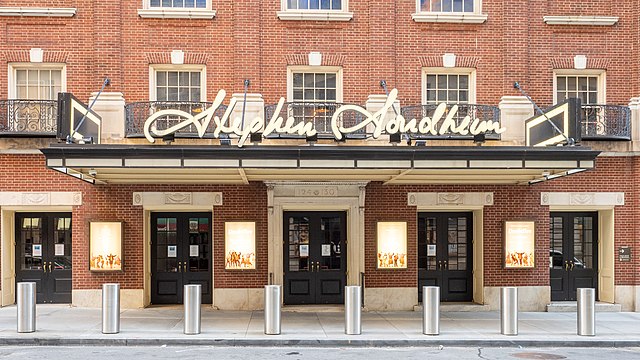On Friday, November 26, the lyricist and composer Stephen Sondheim died, on the same day the Omicron variation of the COVID virus made headlines. That evening in New York, I had tickets to the new adaptation of Sondheim’s musical, Company. Although I teach performance studies at Harvard and have studied theater for decades, that night I learned something new: why live theater matters in the age of COVID. It matters because theater teaches us how to share the hope and danger of being alive together. That night, we knew a variant—possibly more contagious, possibly vaccine-resistant—was hurtling toward New York, and might already be there. We risked contagion to gather in grief and celebration of an American genius.
My companion for the evening was Debra Levine, the Director of Undergraduate Studies of Harvard’s Program in Theater, Dance, and Media (TDM). We entered the Bernard B. Jacobs Theatre past news vehicles and reporters, lucky ticket holders like us, and mourners trying to buy seats. Company was still in previews; it wouldn’t open officially for another two weeks. We sat, cramped and masked, knowing we were about to see a first on Broadway: the performance of a Sondheim show in a world without Sondheim. Something that had never happened before but was the only possibility for the future. “Why don’t you turn around and go back?” I thought, echoing a line from another Sondheim show, Merrily We Roll Along. Like so many events of the past two years, Sondheim’s death was an unwelcome, irreversible change that I had no choice but to accept.
A white woman mounted the stage. I did not recognize her at first, and I imagine many other members of the audience didn’t, either. But we cheered with full throats. She was a person connected to the show, and our applause connected us to the stage and each other. She introduced herself: Marianne Elliott, the director. A second wave of applause, thick with recognition and gratitude. “I would like to introduce the cast to you, so we can share this,” she said. The curtain rose to reveal more than thirty actors and musicians clustered center stage, many holding each other, facing us.
Debra and I rose to our feet, applauding, and the rest of the audience did, too. In hundreds we stood, mirroring the cast standing on stage. They were one company, we another, holding a moment together in our percussing hands.
Eventually, our applause quieted, but we remained standing as Elliott spoke lovingly of her collaboration with Sondheim. They had co-adapted the 1970 musical, shifting the genders of several characters and transporting the action into 2021—no simple task for a score that incorporates telephone busy signals. But Sondheim, Elliott said, “understood about art, and he really understood about the now, and why art should speak to the now.” Company is “not a museum piece. It’s about speaking to its audience, its ephemeral audience every single night, every single day of the year.”

Stephen Sondheim Theatre
Photograph by Ajay Suresh/Creative Commons
At that moment, I took in the now, the here. I was in New York, my hometown, for the first time in two years. In March 2020, when the pandemic closed the theaters, I had tickets to six upcoming shows, including one on Broadway—all transformed, instantly, into ghosts. Now, in November 2021, I was back in a Broadway theater, cheering through a mask. The night before, I had eaten Thanksgiving turkey with my family, another first since the pandemic. And yet, Sondheim was gone.
An important idea in theater studies is that live performance stages the possibility of death. We gather in theaters to watch people on stage—but we know their aliveness, the very quality we came to see, confers vulnerability. “Anything can happen in the woods,” a prince sings in Sondheim’s fairytale show Into the Woods. It’s true in theater as well: an actor can stumble, get sick, or even die while we watch. And even when nothing goes wrong, theater stages loss, because the moment a live act is performed, it ends and disappears. Every song ends, followed by no-song, until another rolls in. “Just a moment/One peculiar passing moment,” in Sondheim’s words.
To gather in theater is to share that vulnerability, that appearance-through-disappearance, living-dying. To know, with Sondheim’s prince, that “any moment we could be crushed.” As I applauded before Company even began, I wondered, Will the show run for months, as planned? Or will Company and the rest of Broadway close because of contagion—again? Are we at a beginning or an end? When will we again gather in theaters and parties, in friendships and families?
Amazingly, Company itself examines this human dilemma, that living is a dance between peril and potential. Company is about love, loneliness, and ambivalence. It asks, how can we “survive being alive”? How can we keep going in a world where, as Patti LuPone sings in a show-stopping number, “everybody dies”? The show delivers Sondheim’s wise answer, exactly what I needed that night: with company. “That’s what it’s really about,” the cast sings: “company!”
Omicron may force us back into lockdown and renewed cycles of social distancing. It may re-close Broadway and much more. But that Friday night, as audience and cast, we came together to say goodbye to Stephen Sondheim, and hello to each other and a newborn show. We kept each other company while facing loss and an insecure future. This is what live theater teaches us to do. It is a lesson we can hold long after the curtain falls.









